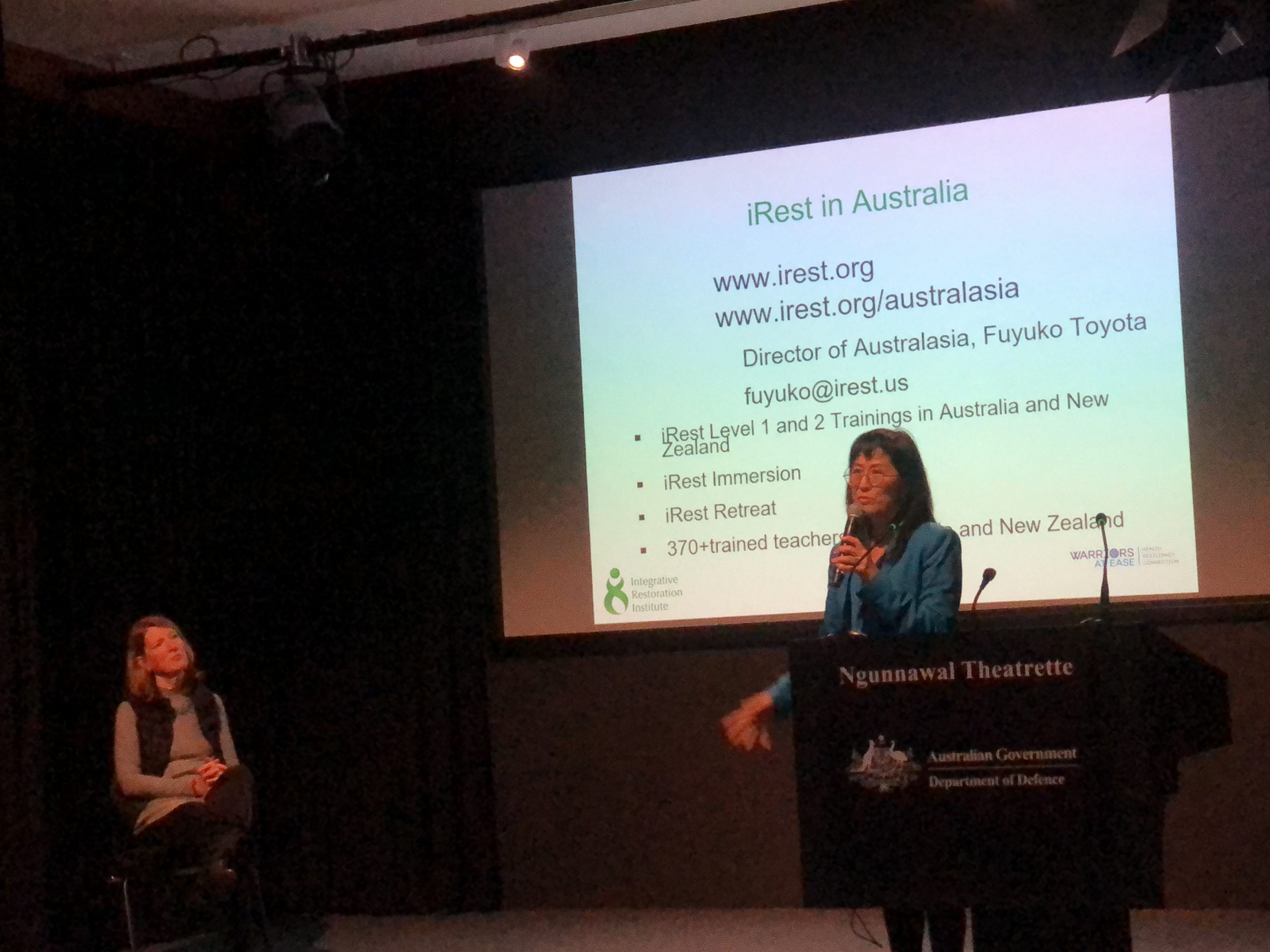Integrated Restoration (iRest) is an evidence-based guided meditation protocol that enhances resilience and assists with trauma recovery. It was developed by Dr. Richard Miller for the U.S. Military at the Walter Reed Army Hospital in the United States. In 2010 the U.S. Army surgeon General endorsed iRest as an approved complementary medicine.
On Tuesday 24 July 2018, Robin Carnes presented the history, challenges and benefits of teaching iRest in the U.S. Military to a group of representatives from the Australian Defence Force, service organisations and first responders at the Russell Offices in Canberra. Robin was the iRest instructor in the first research study of the efficacy of iRest with returned service men and women with PTSD at the Walter Reed Army Hospital in the U.S., and was honoured by the Smithsonian Institute for this pioneering work. As such, she is well qualified to speak about iRest.
Robin spoke of the impressive results of this original study as a part of an existing clinical team at Walter Reed. The addition of iRest into this team enhanced results and this success opened doors for the further use of iRest across the country. There have since been over 30 studies conducted into the efficacy of iRest. iRest is used at over 80 military bases across the U.S. and Canada, as well as being used by deployed military personnel.
iRest was developed from an ancient yogic meditation practice, combined with modern understandings of neuro-science and psychology. The structure of the program makes iRest well suited to the needs of military personnel and it is cognisant of military culture and is a trauma-sensitive practice . From these initial beginnings iRest has gone on to be applied to many different populations (including community centers, clinics, chemical dependency, homeless, schools, hospices, correctional facilities); groups withcompromised nervous systems or trauma, chronic pain, sleep disorders or high stress levels. Robin emphasised that as all people have stress, iRest is beneficial to all human beings.
Robin explained why iRest is so effective. The fight or flight mode of our nervous system can get locked on if threat to life becomes chronic. It can remain locked on even when we are safe. There is a debilitating effect when our nervous system is locked into this hyper-vigilant mode and it isn’t possible to “talk ourselves out of it” when the system is dysregulated in this way. The flood of chemicals that result in our system as we are prepared to meet a threat to our lives effects our entire body as all of the energy goes to support the fight or flight mechanism. iRest is so effective because it switches on the ‘rest and digest’ function of our nervous system, and this, over time, stabilises the nervous system to its natural functioning. The critical first step is to get people into this ‘rest and digest’ system. But iRest offers more. Once the relief to body, mind and emotions is experienced by balancing the nervous system the important work of integrating emotions and beliefs, little by little, step by step, can begin. iRest offers tools to not only integrate unresolved emotions and beliefs related to trauma, but also tools that help to meet whatever life presents. This includes developing self-awareness of thoughts and emotions, building resilience by connecting to an inner resource and building inner strength by refocusing on meaning and purpose.
iRest is about being with life the way it is, tapping into the parts of the brain that allow for greater insight and quieting the parts of the brain that are responsible for uncomfortable or challenging thoughts, feelings, and sensations. Using iRest, people learn to welcome life as it is happening and to respond – not react – to challenging situations.
Fuyuko Toyota, Director of iRest Australasia was also present and spoke of the 400 plus teachers already trained across Australia and New Zealand, many of them ready to take this teaching into the Australian military and veteran community.
Lieutenant Colonel Richard Mogg, himself a trained iRest teacher, recognised the applicability of iRest for the Australian Military. Not just for those suffering PTSD, but also to support high performance, manage stress and as a resilience building mechanism that can be applied pre and post deployment.
Robin left us with a reminder about the integral importance of attending to our nervous system “we brush our teeth every day, we need to take care of our nervous system every day”.
If you’d like more information about iRest in Australia and to discover ways to bring these teachings into military settings please go to www.irest.org/Australasiaor contact Catherine Sherlock (Communications) catherine@irest.usLeigh Blashki (Associate Director iRest Australasia) leigh@irest.usor Fuyuko Toyota (Director iRest Australasia) fuyuko@irest.us.

